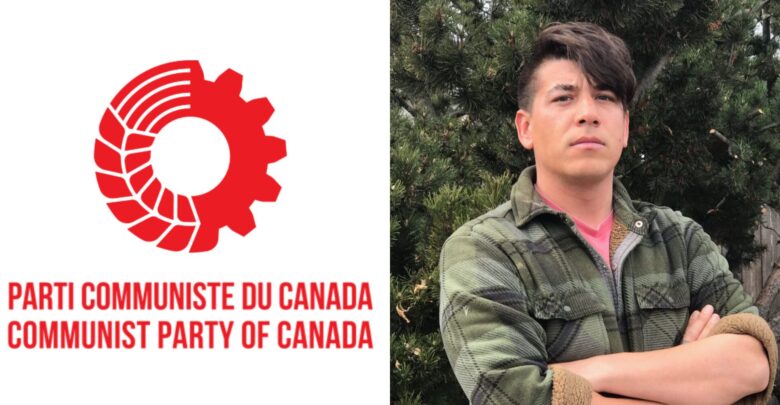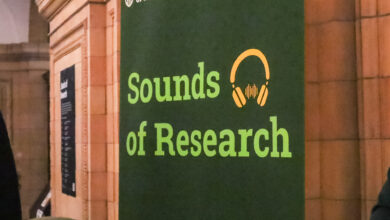Federal election 2025 candidate Q&As: Christian Bourque (Communist Party)
"I would be fighting to lower costs, rent, and raise wages, and that's obviously not just for students," Bourque says.
 Supplied
SuppliedThis article is part of The Gateway’s Q&A series with the 2025 federal election candidates for the Edmonton Strathcona riding.
Christian Bourque is the Communist Party of Canada’s candidate for Edmonton Strathcona in the 2025 federal election. Bourque sat down for an interview with The Gateway about how he and his party would address student issues.
Bourque grew up in Edmonton and has worked in various labour jobs. He told The Gateway he has been a communist since he was 16 and joined the Communist Party seven years ago.
The following responses have been edited for length and clarity.
Why are you running in this election and in Edmonton Strathcona specifically?
Christian Bourque: Election season came around, and I’d never been part of any kind of election before. But I think there’s a chance to make a real change, especially in the modern times we live in, where it seems our allies aren’t really our allies anymore. We’re struggling economically. We have the tariffs, and of course, that’s not the primary reason, but I just think that the Communist Party has a superior program to the other parties that exist.
As for Strathcona, it was an easy choice because it’s a pretty [politically] left area. There’s a lot of movements going on. You have Palestinian protests, you have the Ppo-Ukrainian protests, you have students, so a lot of student movements taking place. It’s a pretty left place for political discourse. And there’s a lot of vegan shops, I guess, if that counts, a lot of vegan restaurants. So you get a lot of people with a lot of different opinions, and it’s already a pretty left area dominated by the New Democratic Party (NDP). So I just thought it would be a good place to run and do some things. We usually always have someone running in that area anyway, and right now, the [Communist] Party has more people running now than we have ever [had] since I’ve been a member, and probably before.
If elected, you would be responsible for representing many of the students who attend the U of A. What would be your priority in representing those students to your party and the government at large?
Bourque: I would say free education or universal education. A lot of people get a little hung up over terminology when they say free isn’t really free, and they’re right. So basically, I want to wipe out student debts like a debt forgiveness thing, but it’s less of a debt forgiveness and more of a just take [the debt] back type thing. I don’t want to ask these companies and educational institutions which are privatized for debt forgiveness. I just kind of want to take it from them and say, no, we don’t have to pay this. Keep in mind, I’m not a student, so I’m not really fighting for me in this case. But it comes down to universal education and the removal of student debt, because we get all these people taking all these courses, and they get their PhDs, or they get their degrees, and then they end up working in a Starbucks and they’re not even using [their degree].
Affordability is a big issue for students, whether that’s the price of groceries or housing. How would you and your party work to address this issue?
Bourque: As a [Member of Parliament (MP)], I can’t make promises. I could make these promises, but it’s not as simple as that. I wish I could say that we would lower prices, but it’s not like that. Once you’re a MP, you have to fight for it in Parliament and then start debates. But what I would do is fight for it. I would be fighting to lower costs, rent, and raise wages, and that’s obviously not just for students. I’d be bringing stuff like that in parliament and probably trying to start debates over [it] as much as I can.
Obviously, I don’t know how many debates go on in Parliament like that. I haven’t really heard too much, but basically, I would just be fighting for lower rent, lower costs, lower taxes, and higher wages, and that’s pretty much all I can do. Besides having a legitimate voice in Parliament, because I’m not sure how people view MPs and how legitimate they are, or if they’re actually representing you. I have a very different way of how I look at modern politics, especially in Canada. I don’t have much faith in a lot of these [MPs], at least if they’re Liberal or Conservative. I have no faith in them whatsoever.
How would you and your party approach financial support for students and post-secondary institutions through things like student loans, grants, or research funding?
Bourque: I think I addressed some of that already by saying student loans shouldn’t exist, or student debt shouldn’t exist. And I don’t think you should have to pay. I don’t know how much people pay, but I hear it can be tens of thousands of dollars, hundreds of thousands of dollars, for you to go to school and get this degree or whatever it is you’re taking. But basically just wiping out [costs] entirely would be better.
Grants and research funding would be on a case-by-case basis because we need more of it. I’m not a scientist and not any kind of professional in any scientific or medical profession for that so I can’t say which grants will be approved or denied or which ones will be changed. But I would like it to be more so that we’re researching things that directly benefit people. I’m not sure what we have going on right now, or what I would change about as far as grants are concerned, but just analyze it on a case-by-case basis, see what historically has worked, what is working, what isn’t working, and just go from there. Try to progress what it is we have that does work, and then try new things, and see what does work.
The U of A has a French speaking campus, which does receive federal funding. What would you and your party do for French speaking post-secondary students?
Bourque: We speak French [in the Communist Party], and like we have Quebecois members, and just like the other political parties, whenever there’s a speech we speak in English and French. I’m not particularly aware of any struggles that the French-speaking campus has. If I was made aware, I would try to address it. But I’m not familiar with any of the struggles in particular [they] have. I don’t know what else to say other than treat them as an equal and try to solve any issues that arise from speaking a different language.
How would you define academic freedom and how would you and your party protect it?
Bourque: I agree with [academic freedom]. I don’t think it’s a common thing and I don’t claim to know how common this problem is, but sometimes you hear about a teacher that got fired for teaching a holocaust didn’t happen. I don’t think that you should be free to be able to say stuff like that, if it’s blatantly false information that endorses or is genocide apologists or something like that. I don’t agree with that. I think, aside from that, students should be free to study whatever they like, to learn. As far as freedom of speaking, students will be able to say generally, whatever they want, so long it’s not inciting violence, or inciting dangerous belief systems or anything like that.
How would you and your party support Indigenous communities and students?
Bourque: As for students, I think I said my piece in regard to universal education, being able to just be a student without enslaving yourself to these private entities. I’ve believed that for a long time. As for Indigenous communities, I’m not aware of a whole lot, but I am Indigenous myself. My best answer to that is just help them out in the same way I would help out, say a poor, homeless person. At the same time as that’s more I have to be arguing in Parliament for the most that I can do.
But I’d like to set up some community, like barbecues and stuff like that, not just to help the homeless, but get a community going, and mutual aid so people help each other out, and are more out there. Because it seems like consumers and people are kind of just all alone, and they don’t really trust each other, and they don’t want to rely on each other, or they’re afraid of just trust as a concept between each other. It’s leading to people being isolated by themselves, and it’s just not healthy.




